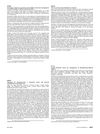 1 citations,
March 2014 in “Journal of The American Academy of Dermatology”
1 citations,
March 2014 in “Journal of The American Academy of Dermatology” Hair care practices and concerns about maintaining hairstyles can reduce how often African American women exercise.
 1 citations,
May 2017 in “Journal of The American Academy of Dermatology”
1 citations,
May 2017 in “Journal of The American Academy of Dermatology” A woman's hair grew back after stopping acitretin for psoriasis and getting steroid treatment, and low vitamin D might be linked to alopecia severity.
35 citations,
October 2019 in “Journal of pediatric health care” Children with darker skin tones can have specific skin conditions that need tailored treatments.
 19 citations,
January 2016 in “Dermatology Research and Practice”
19 citations,
January 2016 in “Dermatology Research and Practice” The study concluded that hair loss in Indian women is not significantly linked to anemia or thyroid problems, but checking thyroid function could help those with ongoing hair loss.
1 citations,
January 2022 in “Skin Appendage Disorders” Lupus erythematosus can mimic alopecia areata, and trichoscopy is key for accurate diagnosis and better patient outcomes.
15 citations,
March 2018 in “Cancer Medicine” Alopecia areata patients have varied cancer risks, with some cancers being lower and others higher.
 September 2023 in “International Journal of Trichology”
September 2023 in “International Journal of Trichology” Oral Vitamin D can improve hair density and reduce hair loss in Telogen Effluvium patients.
 8 citations,
January 2018 in “Journal of the American Academy of Dermatology”
8 citations,
January 2018 in “Journal of the American Academy of Dermatology” Diphenylcyclopropenone treatment helps prevent hair loss relapse in alopecia areata patients.
 April 2019 in “Advances in Cosmetic Surgery”
April 2019 in “Advances in Cosmetic Surgery” The document concludes that ongoing medical therapy is crucial for preventing hair loss, and surgical options can restore hair, with future treatments for hair loss being promising.
 1 citations,
April 2019 in “Advances in Cosmetic Surgery”
1 citations,
April 2019 in “Advances in Cosmetic Surgery” Platelet-rich plasma shows potential for hair growth, but more research is needed to determine the best preparation method.







